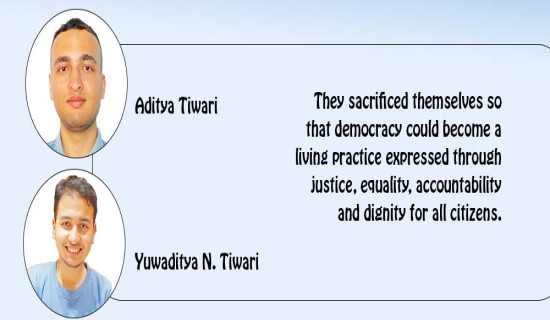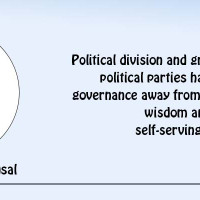- Friday, 30 January 2026
What Miffs School Teachers?
Last week, teachers from Nepal's government schools, also known as community schools, took to the streets of Kathmandu to protest a proposed School Education Bill that seeks to amend existing laws governing public school education which have been in place for decades in order to accommodate the federal set-up of the nation. The bill would devolve rights and power to provincial and local governments, and many teachers believe these changes could be detrimental to their well-being. After three days of protests and subsequent meetings with government officials, an agreement was struck, resulting in the withdrawal of the protests.
Teachers, represented by the Federation of School Teachers Organisations, were outraged by various provisions in the proposed bill affecting their promotions, bonuses, facilities, pensions, and other benefits. The proposed transfer of management and operation of public school education to local municipal bodies is the major concern for the agitating teachers. Another contentious issue is the proposed abolition of the Class 10 examination in favour of the grade 12 examination as the last school-level assessment. They also demanded that new bill should include provisions for facilities based on seniority, professional development, and job security.
Dissatisfaction
Over five million students in approximately 29,000 government schools were affected by the teacher convergence in Kathmandu. However, teachers working in public schools under the relief quota scheme, of whom there are around 40,000, voiced their dissatisfaction with the arrangement made with the government, calling it an eyewash, and vowed to continue their protest. According to them, the deal did not address their concerns. The relief quota teachers have urged that all of them be permitted to engage in internal competition to become permanent teachers or to continue teaching until they reach the age of 60, which is the retirement age for school teachers. However, the existing provision only enables around 75 per cent of them to compete for permanent positions in internal competition.
According to the understanding, public school teachers will be assigned to a government hierarchy depending on their ranks and will be eligible for promotion every 10 years. An expert group, including federation representation, will look into teacher integration and periodic promotions. Additionally, the bill would include provisions to prohibit unjustifiable actions against teachers, no teacher transfers would take place without the approval of head teachers, and require the consent of the school management committee for the transfer of head teachers. The agreement also involves integrating the contribution-based social security programme for teachers and providing legal provisions for different allowances comparable to those awarded to civil servants.
The government has promised to defend teachers' trade union rights and to create rules for the appointment, minimum wage, social security, and record-keeping of teachers also working in private schools. Regulations for the School Education Act will be prepared and executed with inputs from education professionals and the teachers' federation. The impactful teachers’ movement in the capital raises concerns that public school teachers may be putting their personal interests above the improvement of public schools, although they claimed to fight for general educational excellence. Besides teachers’ demands, the government must recognise the educational sector's various and complicated requirements as inclusion, openness, and cooperation are critical for building a strong education system that serves all students and teachers.
It is also true that some of the claims made by teachers, such as limiting of local government’s authority when it comes to manage and operate public schools, go against constitutional provisions that delegate public school education management to local governments. While mounting pressure on the government, agitated teachers have forgotten that decentralisation may strengthen local administrations, effective resource management, and the education system. Historically, the federal government has had a substantial role in supporting and controlling school level education. However, in accordance with the spirit of our federal constitution, the central government now proposes to delegate authority over school operations to local levels, which should be welcomed, but teachers perceive it as a step towards limiting their well-being.
Meanwhile, professional development for teachers is welcome, but it must be complemented by clear standards for advancements and appointments. The development of a uniform and equitable method for choosing school principals or head teachers based on experience and merit must be the norm. Some of these requests may necessitate constitutional revisions, putting legal obstacles and possibly financial obligations on the government, which may discourage enrolment in government schools. Teachers in government schools have considerable political advantages comparing to other professions. Political participation and influence help them generate the respect and command in communities.
Collaborative efforts
However, teachers are frequently criticised for utilising their political ties to undermine instructional quality in schools. It is commonly stated that the dismal state of school education is primarily attributable to teachers’ ineptitude and political affiliation. Any nation's education laws and rules play a critical role in developing and shaping its education system, through which students learn, teachers teach, and schools operate across the country. As a result, the effectiveness of any educational reform is determined by the state's policies and structural reforms. The recent agitation by school teachers has highlighted the importance of revising and updating the School Education Bill. This emphasises the need of incorporating all essential stakeholders, including teachers, parents, and local governments, in the establishment of education policy in order to achieve effective reforms.
Our teachers and other stakeholders have to work together to address various anomalies such as declining quality of education, rising school dropouts and diminishing success rates in examinations. Despite efforts from the federal government to provide scholarships, free education, free books and stationery, sanitary pads for girl students and day-time school meals for all children, more needs to be done to reduce the school drop-out rate. Teachers must take immediate action towards this alarming situation before it gets worse. Only through collaborative efforts between stakeholders can we truly reach our goals of improving our educational system for all citizens.
(Upadhyay is former managing editor of this daily.)

















